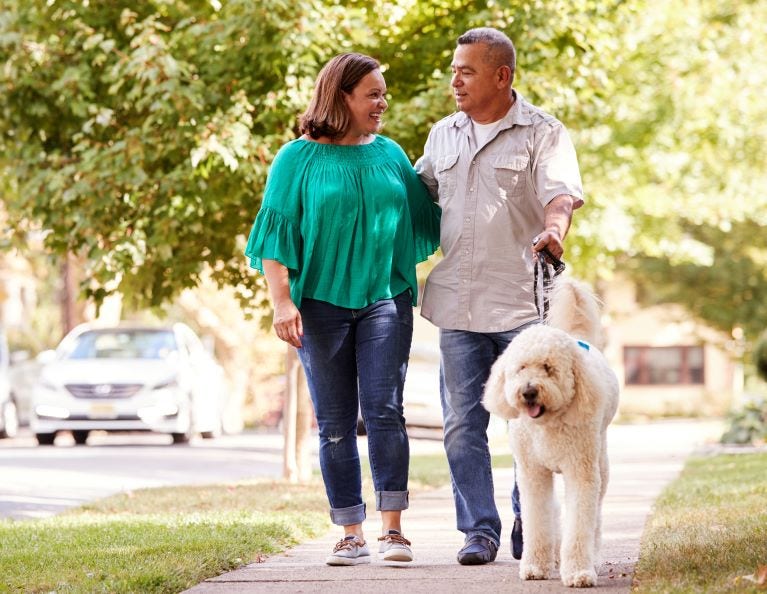For Your Best Life After Cancer—Eat Well & Be Physically Active
Updated ACS guidelines for diet and physical activity aim to help cancer survivors reduce their risk for the cancer's return and for dying from cancer.

There are nearly 17 million cancer survivors in the United States. That’s about equal to the combined number of people in these 4 major US cities: New York (9 million), Los Angeles (4 million), Chicago (3 million), and Dallas (1 million). And the number of survivors continues to grow. Survivors want to know how to improve their chances of surviving cancer and keep it from returning. The American Cancer Society (ACS) helps by providing Nutrition and Physical Activity Guidelines for Cancer Survivors. The most up-to-date guideline was just published in CA: A Journal for Clinicians and includes a Patient Page with easy-to-understand information and tips.
Since the guidelines’ last version in 2012, researchers have published large, randomized clinical trials, literature reviews, analyses of prospective studies of cancer patients to learn how modifiable factors might contribute to cancer recurrence or survival. Multiple large cancer organizations have also published guidelines. To make this mass of information easier to use for health care providers, cancer survivors, and their families, researchers from the ACS, as well as experts from across the US developed these new recommendations based on evidence-based findings.
Recommendations for cancer survivors emphasize early assessment and counseling for nutrition and physical activity.
There are 2 general recommendations based on the best evidence for optimal cancer care that everyone should start as soon as possible after a cancer diagnosis.
Nutritional assessment and counseling from a qualified professional. The goal is to prevent or treat nutritional deficiencies, preserve muscle mass, and manage side effects of treatment—such as mouth sores or overwhelming fatigue—that could affect a person’s ability to eat healthfully.
“It’s easy to get bad and incorrect nutrition advice from friends, on television, in vitamin stores, social media sites, and other places. But if you’re at risk for malnutrition or are having diet-related issues, your best bet for nutritional counseling is with a registered dietitian (RD) or Registered Dietitian Nutritionist (RDN). An RD will help you create a food plan that’s tailored to your needs and realistic for you. Anyone can call themselves a nutritionist, but RDs have specialized education and have to pass a national board exam. Many RDs have additional training in cancer care.”
—Marjorie McCullough, ScD, RD, senior study author
Here are a few of the recommended nutritional resources from the updated guideline:
- Nutrition for People With Cancer, ACS
- Food Safety for People With Cancer, Infographic, US Department of Agriculture (USDA)
Physical activity assessment and counseling from a qualified professional. The goal is to help people prepare for treatments, tolerate and respond to treatments, and manage some symptoms of cancer and side effects of treatment.
“Physical activity offers many benefits to cancer survivors, both during and after treatment. Not only can it improve survival for some cancers, but it can also help ease some symptoms and side effects of cancer treatment, like fatigue, anxiety, and depression. The American College of Sports Medicine website has a searchable directory of their Moving Through Cancer program, which helps patients find cancer exercise professionals or programs in their community”
—Erika Rees-Punia, PhD, MPH, study author
Here are a few of the recommended physical activity resources from the updated guideline:
- Physical Activity and the Person with Cancer, ACS
- Effects of Exercise on Health-Related Outcomes in Those With Cancer, Infographic, American College of Sports Medicine (ACSM)
Recommendations to improve chances of a long disease-free life. The Nutrition and Physical Activity Survivor Guidelines include several recommendations to improve long-term health after a cancer diagnosis.
- Avoid obesity and maintain or increase muscle mass through diet and physical activity.
- Follow a healthy eating pattern that provides enough nutrients and that helps lower risk of other chronic diseases, such as heart disease, stroke, and diabetes.
- Be physically active regularly, customizing the activity based on the type of cancer, symptoms, overall health, types of treatment, and side effects of treatment. There’s “sufficient” evidence that exercise during cancer treatment can help manage several treatment related side effects, such as anxiety, depression, fatigue, physical function, bone health, sleep, and lymphedema.
- Follow the ACS Guideline for Diet and Physical Activity for Cancer Prevention.
Evidence-based research is the most substantial and robust for breast cancer survivors.
There’s a significant enough body of evidence about breast cancer survivors to provide some specific nutrition, activity, and obesity guidelines to help improve survival.
Diet and Breast Cancer
- Eating healthfully, after a diagnosis of breast cancer improves overall survival, but there is not enough evidence to show that healthy eating reduces the recurrence of breast cancer.
- Eating a Western diet that’s high in red meat, processed meats (bologna, hot dogs, bacon, and others) and sweets increases the risk of death.
- Limited data shows eating foods with soy after a breast cancer diagnosis may lower the risk of the cancer’s recurrence.
- Drinking alcohol after a diagnosis of breast cancer does not seem to be associated with an increased risk of death from all causes, according to the existing evidence.
Physical Activity and Breast Cancer
- Being physically active is strongly and consistently linked to a lower risk of death from breast cancer and other causes.
- Decreasing physical activity after a diagnosis of breast cancer is linked with a higher risk of death from any cause.
Obesity and Breast Cancer
- Having obesity (BMI of 30 or higher) after a diagnosis of breast cancer is associated with a higher chance of the cancer returning , as well as a higher risk for dying from breast cancer and other causes.
- It is not known how intentionally losing weight (vs losing weight due to the cancer) affects survival after a diagnosis of breast cancer.
“There’s a lot about the effect of excess body fat on breast cancer outcomes that’s not well understood. We don’t know the roles of weight distribution, such as more or less abdominal fat, or of body composition, such as muscle mass vs body fat. Several studies suggest that weight gain after a diagnosis of breast cancer increases the likelihood of dying from breast cancer. But there is only limited evidence that intentional weight loss after diagnosis will be helpful. The problem with interpreting the results of these studies is that the intentionality of weight loss was not considered, and losing weight without trying could be a result of cancer progression.”
—Cheryl Rock, PhD, RD, lead study author, University of California at San Diego
Some dietary, physical activity, and obesity evidence exists for other types of cancer.
Eating a Western diet is associated with worse survival for people diagnosed with:
- Colorectal cancer
- Prostate cancer
Drinking alcohol is associated with a higher risk of death from all causes after a diagnosis of:
- Head and neck cancer
- Laryngeal and pharyngeal cancer
- Liver cancer
It’s not known how drinking alcohol affects survival after a diagnosis of most cancer.
Having overweight or obesity is associated with worse survival after a diagnosis of:
- Bladder cancer. A higher BMI (BMI of 25 or higher) in the “overweight” range is associated with a higher chance of the cancer returning and progressing in non-muscle invasive disease. The evidence is inconclusive about higher BMIs affect the risk of dying from bladder cancer.
- Endometrial cancer. Most evidence suggests that a BMI of 30 or higher (the “obesity” range) at diagnosis is associated with a higher risk of death from all causes. A higher BMI has not been associated with the cancer’s return or progression or a higher risk of dying from endometrial cancer.
Being physically active after a diagnosis improves survival after a diagnosis of:
- Colorectal cancer
- Female gynecological cancers (cervical, endometrial, and ovarian)
- Prostate cancer
Evidence is much more limited for cancers that are less common or that have lower survival rates.
American Cancer Society news stories are copyrighted material and are not intended to be used as press releases. For reprint requests, please see our Content Usage Policy.



